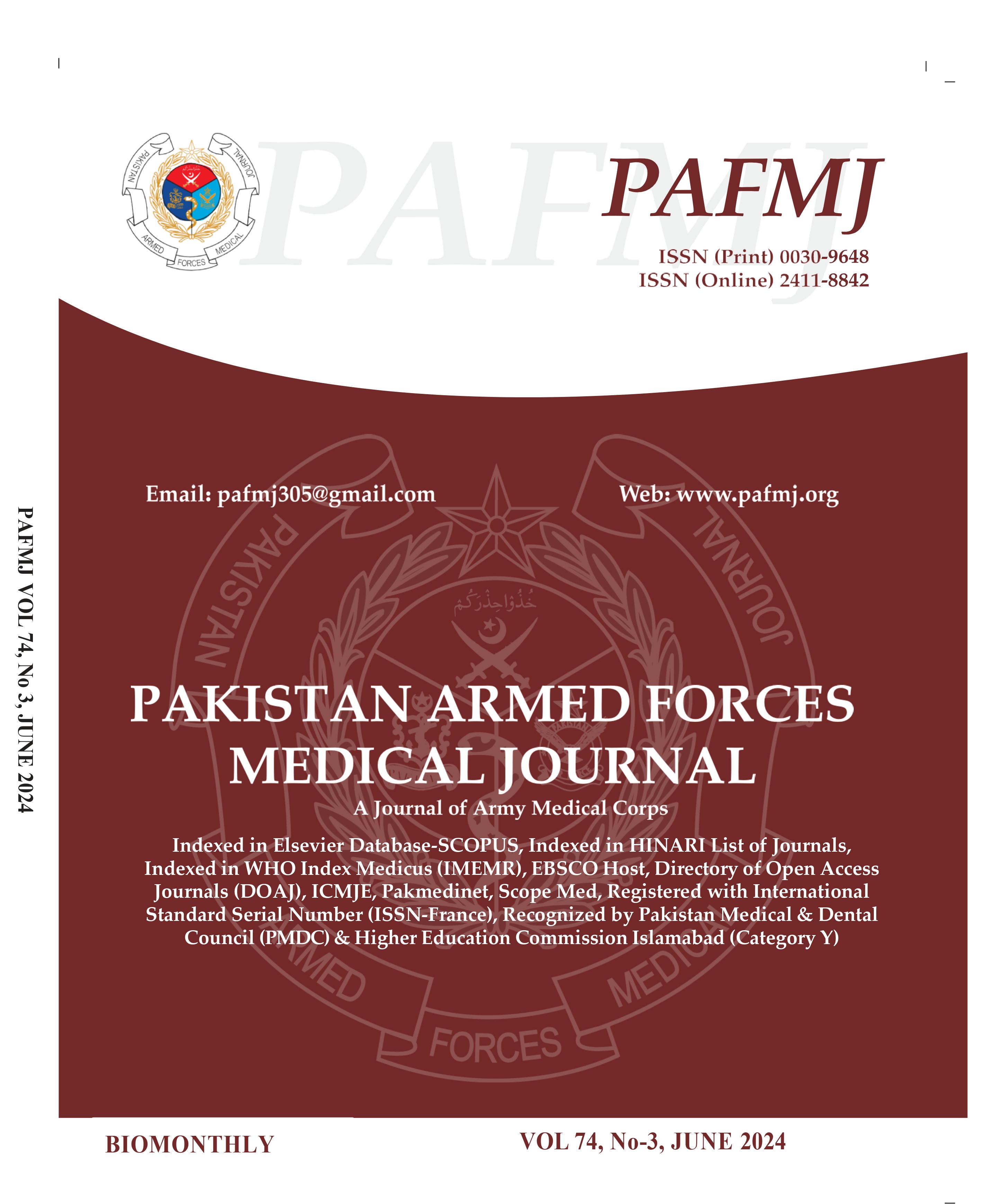Exploring Attributes of Health Professions Educationists in their Workplace with the Lens of Bourdieu’s Theory of Practice: An Exploratory Study
DOI:
https://doi.org/10.51253/pafmj.v74i3.12128Keywords:
Attributes, Bourdieu’s theory of practice, Department of medical education, Health professions education,qualitiesAbstract
Objective: To explore the attributes of health profession educationists in the departments of medical education in their institutions.
Study Design: Exploratory qualitative study.
Place and Duration of Study: Public and Private Sector Medical and Dental Colleges, Pakistan from Mar to Jul 2022.
Methodology: The total number of participants was fifteen, including the Head of the Department and faculty members of DME. Consent was taken, and online scheduled interviews were conducted in English via Zoom software. The researcher recorded, transcribed, and analyzed the data manually. Another researcher rechecked it, and when saturation was achieved, data collection was stopped. The interviews were manually transcribed, followed by coding and thematic analysis of the data.
Results: After thematic analysis, three Themes, 15 sub-themes, and 30 codes emerged. The themes were personality traits, working relationships, and commitment to excellence. For the successful accomplishment of DME's challenging tasks, HPE faculty are found to be altruistic, responsible, motivated, enthusiastic, resilient, work with passion, and humble. They are visionary, innovative, cooperative, and have multi-tasking and convincing capabilities. With these attributes, HPE faculty efficiently manage uncertainty and challenging situations.
Conclusion: The Habitus (attributes of value-driven, resilience, hardworking, passionate, consistent, patient, visionary, and innovative) led to the execution of DME tasks despite limited field (resistance from administration, faculty, and organization) and capital (deficient human, infrastructural and financial resources)
Downloads
References
Al Shawwa LA. The establishment and roles of the Medical Education Department in the faculty of Medicine, King Abdul Aziz University, Jeddah Saudi Arabia. Oman Med J 2012; 27(1): 4-9. https://doi.org/10.5001/omj.2012.02
Bendermacher GWG, Dolmans DHJM, de Grave WS, Wolfhagen IHAP, Oude Egbrink MGA. Advancing quality culture in health professions education: experiences and perspectives of educational leaders. Adv Health Sci Educ Theory Pract 2021; 26(2): 467-487. https://doi.org/10.1007/s10459-020-09996-5
Hassan B, Jamil B, Waheed N, Sarwar N, Abid S, Daud F, et al. Challenges Faced by Medical Educators at their Workplace A Qualitative Study. Int J Pathol 2019; 17(2): 89–95.
Davis MH, Karunathilake I, Harden RM. AMEE Education Guide no. 28: the development and role of departments of medical education. Med Teach 2005; 27(8): 665-675.
https://doi.org/10.1080/01421590500398788
Sadiq N, Fatima F, Rauf A, Fatima S, Ayub R. Identifying Professional Attributes and Behaviors of Healthcare Educators in Distance Learning Programs. Int J Interact Mob Technol 2023; 17(14): 165–176. https://doi.org/10.3991/ijim.v17i14.39783
Maniate JM. Trends and Opportunities in Medical Education: Aligning to Societal Needs and Expectations. Arch Med Heal Sci 2017; 5(2): 154–156. https://doi.org/10.4103/amhs.amhs_98_17
Qureshi SN, Khan RA. Challenges Faced by Faculty of Medical Education Due to the Structural Variation in its Departments across Medical Colleges. Pak J Med Health Sci 2023; 17(01): 148–148. https://doi.org/10.53350/pjmhs2023171148
Latif MZ, Wajid G. Reforming Medical Education in Pakistan through strengthening Departments of Medical Education. Pak J Med Sci 2018; 34(6): 1439-1444.
https://doi.org/10.12669/pjms.346.15942
Varpio L, Bidlake E, Humphrey-Murto S, Sutherland S, Hamstra SJ. Key considerations for the success of Medical Education Research and Innovation units in Canada: unit director per-ceptions. Adv Health Sci Educ Theory Pract 2014; 1 9(3): 361-77. https://doi.org/10.1007/s10459-013-9479-z
Batool S, Raza MA, Khan RA. Roles of medical education department: What are expectations of the faculty? Pak J Med Sci 2018; 34(4): 864-868. https://doi.org/10.12669/pjms.344.14609
Khan RA. Role of Medical Educationists, Educators, and Teachers in Health Professions Education. Health Profes Educ J 2019; 2(2): 9. https://doi.org/10.53708/hpej.v2i2.237
Creswell JW, Poth CN. Qualitative inquiry and research design: Choosing among five approaches. Sage Publications; 2016.
Merriam SB, Tisdell EJ. Qualitative research: A guide to design and implementation. John Wiley & Sons; 2015.
Varpio L, Ajjawi R, Monrouxe LV, O’Brien BC, Rees CE. Shedding the cobra effect: problematising thematic emergence, triangulation, saturation and member checking. Med Educ 2017; 51(1): 40–50 https://doi.org/10.1111/medu.13124
Kitto SC, Chesters J, Grbich C. Quality in qualitative research. Med J Aust 2008; 188(4): 243-246.
https://doi.org/10.5694/j.1326-5377.2008.tb01595.x
Sethi A, Javaid A. Accreditation System and Standards for Medical Education in Pakistan: It's time we raise the bar. Pak J Med Sci 2017; 33(6): 1299-1300.
https://doi.org/10.12669/pjms.336.14178
Harden RM. Looking back to the future: a message for a new generation of medical educators. Med Educ 2011; 45(8): 777-84. https://doi.org/10.1111/j.1365-2923.2011.03934.x
Abbasi LS, Yasmeen R, Sajjad T. Challenges faced by health professions educationists en route to educational reforms in Pakistan. J Educ Health Promot 2022; 11: 315.
https://doi.org/10.4103/jehp.jehp_424_22
Gruppen LD. The Department of Medical Education at the University of Michigan Medical School: a case study in medical education research productivity. Acad Med 2004; 79(10): 997-1002. https://doi.org/10.1097/00001888-200410000-00023
Saaiq M, Khan RA, Yasmeen R. Digital teaching: Developing a structured digital teaching competency framework for medical teachers. Med Teach 2024: 1-7.
Downloads
Published
Issue
Section
License
Copyright (c) 2024 Shaista Noor Qureshi, Khaula Gul, Faiza Gulfam, Fouzia Sulatana, Zainab Akbar, Sana Siddiqui

This work is licensed under a Creative Commons Attribution-NonCommercial 4.0 International License.















